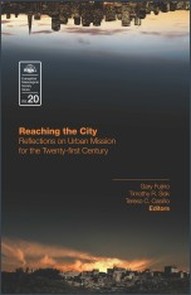posts
|
The 2013 Southeast Regional Meeting of the Evangelical Missiological Society will take place March 8-9, 2013 at Columbia International University in Columbia, SC. This year's theme is "The Missionary Family: Witness, Concerns, Care."
To propose a paper, submit a title, 200 word abstract, and brief description of yourself to Ed Smither [email protected] before January 15, 2013. If selected, papers ought to be about 4500-7000 words in length. At the broadest level, categories related to missionary families and member care include, but are not limited to, such things as: • Nurturing spiritually and emotionally healthy missionary families • The missionary family as model and witness • Marriage and gender: husband/wife relations, parenting, discipline • Educating missionary kids: home school, boarding school, public school • MKs as third culture kids and the development of identity • Stressors for missionary families; long-distance parenting; intercontinental marriages • Missionary responsibilities toward aging parents • Preparing mission families for transitions, re-entry, relocation, retirement • Financial realities of missionary families: salary, health insurance, pension, vacations, college. For full details on the call for papers check HERE. To join or renew your EMS membership check HERE. In chapter 5, the final chapter of Brazilian Evangelical Missions in the Arab World, I discuss a number of areas of observed theology at work in the Brazilian missions movement specifically among Arabs. One key element is that Brazilians show evidence of Word and deed ministry--proclaiming the historic, kerygmatic message of salvation in Christ while also ministering to real human needs. Part of chapter 5 was published in the Fall 2011 issue of the South African theological journal Verbum et Ecclesia. Below is an introduction to the article which can be read in its entirety HERE.
In a village inhabited by refugees and displaced peoples, a soccer school is established for the community’s children. In a hospital, a nurse makes her rounds, dispensing medicine and praying for patients. During classes at a business-training center, a teacher lectures on how to start a small business while growing in one’s Christian character. Each scenario is an example of Christian work presently being performed by Brazilian evangelical workers serving in the Arab world. By proclaiming the traditional Gospel message of salvation and compassionately caring for the physical needs in their context, these Brazilian transcultural workers are applying a vital aspect of Brazilian and Latin American missiology known as missão integral [the ‘whole Gospel’]. In this article, I will first show the historical development of this theological approach within the Brazilian and Latin American evangelical spheres through the work of the Latin American Theological Fraternity – a movement founded in 1970 that maintained historic evangelical values (i.e. a high view of Scripture, the necessity of conversion) while also taking Latin America’s great social needs into account. Nurtured by thinkers such as René Padilla (Ecuador), Orlando Costas (Puerto Rico), Samuel Escobar (Peru), and later Valdir Steuernagel (Brazil), the movement has not only responded to the concerns raised by Liberation theologians, but it has also influenced the direction of the Lausanne Movement – an expression of global evangelicalism. Secondly, I will discuss how missão integral has found its way into the missional ‘bloodstream’ and become a central value for some Brazilian and Latin American missions organisations, including Missão Antioquia (1975) and PM International (1984). Finally, based on 55 interviews conducted in 2009–2010 with Brazilian workers and mission leaders focusing on the Arab world, I will show how Brazilian workers are demonstrating missão integral through their ministries and also why this approach is relevant in the Arab-Muslim world. At the 2012 Evangelical Missiological Society annual meeting in Chicago, Reaching the City: Reflections on Urban Mission for the Twenty-first Century was released. This monograph contains the published papers from last year's EMS meeting on urban mission and is available from William Carey Library. Here is a snap shot from the publisher:
Rapid urbanization and globalization processes worldwide have changed the landscape of our times. In Asia and Africa the number of urban dwellers increases by an average of one million per week, according to the United Nations. More than half of the globe’s seven billion human beings now live in cities. These realities have far reaching implications for mission in urban contexts at the start of the third millennium. Reaching the City: Reflections on Urban Mission for the Twenty-first Century seeks to address the missiological challenges associated with this new world order. Each author in this collection respectfully builds upon the significant contributions of seminal writers such as Ray Bakke, Jacques Ellul, Basil of Caesarea and others, while making new and creative proposals for urban mission in our world today. Beginning with the bigger picture of the global challenges of urbanization, and moving through theological, historical, and educational perspectives, this volume concludes with a rich bevy of case studies engaging these new realities of both North American and international cities to encourage a missional thrust to reach these communities. I had the privilege to write chapter 4, entitled "Basil of Caesarea: An Early Christian Model of Urban Mission." Here's a taste: “The hungry are dying… . The naked are stiff with cold. The man in debt is held by the throat” (Basil, Sermon 6.6 in Holman 2001, 103). This is how Basil (AD 329–379) described his city, Caesarea of Cappadocia, in the late fourth century, especially amid a lingering famine that plagued his region. As the twenty-first-century church ministering in the world’s cities continues to deal with problems such as hunger, usury, corruption, unemployment, displaced peoples, and even slavery, it seems useful to consider some models of urban mission from the church’s past. In this article, I will explore the approach to urban ministry by the well-known church father and bishop Basil who is remembered mostly for his contributions to fourth-century Trinitarian theology. Following a brief survey of his life and call to ministry and the context in which he ministered, I will discuss his practical strategies and theology of mission regarding ministry in the city. In conclusion, I will begin a reflective conversation between Basil and modern practitioners on ministering in urban contexts. Past volumes in the EMS series can be accessed HERE. The following is an abstract of my article published in the October 2012 issue of Evangelical Missions Quarterly which can be fully accessed by subscription HERE.
Short-term missions (STMs), particularly from the United States, is a huge enterprise filled with the courageous stories of humble servants, but also the fun experiences of adventure seekers (Priest 2008, i-iv; Moreau 2008, 11-20; Livermore 2006, 43-108). The STM phenomenon raises important questions about both motivations for ministry and Christian stewardship. . . One of our biggest questions is how short-term work relates to long-term ministry. That is, how can a STM team helpfully contribute to long-term work, and how do we help short-termers become long-termers? . . . To illustrate this value and process, I would like to highlight a healthy model of a long-term team in Eastern Europe (we’ll call them “Go Global”) that effectively integrates STM work into their ongoing ministry. |
Archives
November 2023
|


 RSS Feed
RSS Feed
